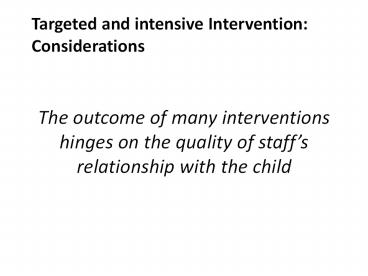The outcome of many interventions hinges on the quality of staff
Title: The outcome of many interventions hinges on the quality of staff
1
The outcome of many interventions hinges on the
quality of staffs relationship with the child
Targeted and intensive Intervention
Considerations
2
Targeted and Intensive Interventions
- Many good interventions fail due to inability of
the implementing staff to establish a positive
helping relationship with the child
3
Life Space Crisis Intervention
- Establishing effective positive helping
relationships with children - Diagnosing and breaking self defeating patterns
of behavior
4
The Power of Language
- Self Defeating Behavior
- Versus
- Bad Behavior
5
Children Who Are Heard Listen
- Children want to tell their story
6
a
d
t
i
n
o
u
n
o
s
F
o
f
e
e
L
r
S
h
C
T
I
Perceiving Thinking Feeling Behaving
Understanding the Differences in
Psychological Worlds
Understanding the Dynamics of
the Conflict Cycle
Developing the Art of Listening
Attending
Responding
Decoding
LSCI Institute
7
COGNITIVE THEORY
- Stream of Consciousness Continuous flow of
observation and thought in the present. - Perceptual Set Fundamental beliefs based
on personal history. - Active Self-Talk Conscious internal
dialogue filtered by the Perceptual Set.
8
(No Transcript)
9
What is interesting about this photo of a vase?
Notice that you can see only one image at a
time. One image is always the foreground, the
other, the background.
10
(No Transcript)
11
Cognitive Restructuring
- Children with self defeating patterns of behavior
usually have self defeating patterns of thinking. - In order to change the behavior we must first
understand how they think - With patience and structure children can learn to
think differently and learn to self manage their
own behaviors effectively
12
(No Transcript)
13
The Conflict Cycle
14
THE CONFLICT CYCLE
Play Video
15
To resolve an emotionally charged event you must
first deal with the feelings
- Thoughts---Feelings---Behavior
16
(No Transcript)
17
(No Transcript)
18
The Six Stages of LSCI
DRAIN OFF
1
Drain off the students intense emotions by
acknowledging feelings.
19
The Six Stages of LSCI
DRAIN OFF
1
TIMELINE
2
By using affirming and listening skills, discover
the students point of view.
20
The Six Stages of LSCI
DRAIN OFF
1
TIMELINE
2
CENTRAL ISSUE
3
Identify the students vital interest and select
the appropriate LSCI Reclaiming Intervention.
21
- The Script
- Acknowledge the feelings
- Affirm. Make 2-3 affirming statements
- Get the childs perspective and restate
- Set limits giving choices as needed
22
Two Levels of Training
- Foundation Skills
- Usually one to two days of training appropriate
for all building staff - LSCI Certification
- A five day or semester long graduate course
format for professional staff
23
Ken Kramberg
- (802) 295-2095
- kenkramberg_at_gmail.com

